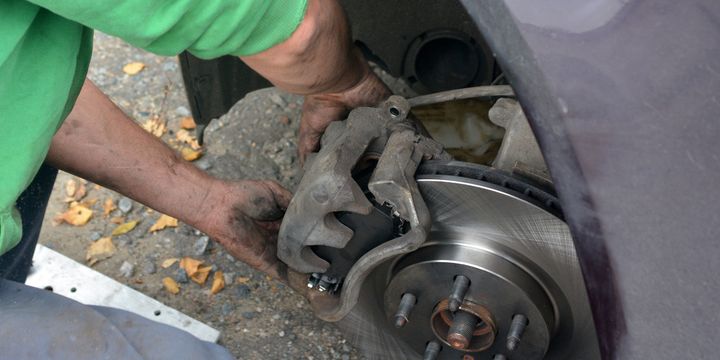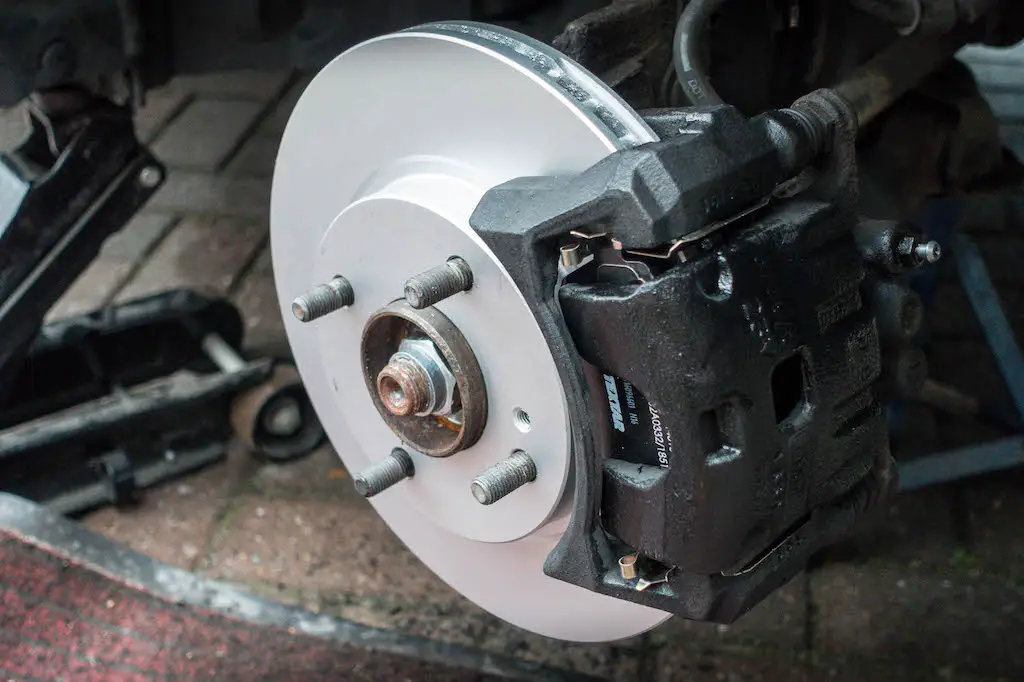


Brake calipers are essential components of a vehicle's braking system, responsible for applying the necessary clamping force to slow down or stop the vehicle. Over time, these components can wear out, become damaged, or develop leaks, compromising overall braking performance and safety. In such cases, replacing the brake calipers becomes crucial to ensure optimal braking and prevent potential accidents. This comprehensive guide will delve into the intricacies of brake caliper replacement costs, exploring various factors that influence the overall expense, as well as providing insights into DIY versus professional replacement, signs of faulty calipers, and maintenance tips.

Brake calipers are hydraulic components that house the brake pads and apply pressure to the brake rotors when the brake pedal is depressed. They are an integral part of a vehicle's disc brake system, which is commonly found on the front wheels of most modern vehicles and on all four wheels of many high-performance and luxury models. Understanding the importance of brake calipers and the reasons for their replacement is crucial for ensuring safe and reliable braking performance.
The average cost of replacing brake calipers can vary significantly depending on several factors. Here's a breakdown of the typical cost range:
| Cost Factor | Average Range |
|---|---|
| Parts (per caliper) | $100 - $500 |
| Labor (per caliper) | $150 - $400 |
| Total Cost (per caliper) | $300 - $1,000 |
It's important to note that these costs are approximate and can fluctuate based on various factors discussed in the following sections.
The cost of brake caliper replacement can differ substantially based on the vehicle's make and model. Here's a general comparison:
Economy vehicles: $300 - $600 per caliper
Mid-range vehicles: $400 - $800 per caliper
Luxury and high-performance vehicles: $600 - $1,000+ per caliper
Luxury and high-performance vehicles tend to have more expensive brake components, including calipers, due to the use of higher-quality materials, advanced engineering, and specialized manufacturing processes.
There are different types of brake calipers, each with varying levels of complexity and cost:
Fixed calipers: Typically the most affordable option, as they are bolted to the suspension and do not move.
Floating calipers: More expensive than fixed calipers due to their increased complexity, as they slide along a pair of pins or bolts.
Opposed piston calipers: Often the most costly type, featuring pistons on both sides of the caliper to apply equal pressure to the brake pads.
When replacing brake calipers, you have the option of choosing between OEM (Original Equipment Manufacturer) parts or aftermarket parts:
OEM parts: Designed specifically for your vehicle, ensuring a perfect fit and optimal performance, but generally more expensive.
Aftermarket parts: Typically more affordable than OEM parts, but may not offer the same level of quality or longevity.
In addition to the cost of the brake caliper itself, you'll also need to factor in labor costs. Labor rates can vary significantly based on your location and the repair shop you choose:
Urban areas or dealerships: Higher labor rates, typically $100 - $200 per hour.
Independent repair shops: Lower labor rates, typically $60 - $120 per hour.
The complexity of the replacement job can also impact labor costs, as some vehicles may require additional disassembly or specialized tools.
When it comes to replacing brake calipers, you have the option of doing it yourself (DIY) or hiring a professional mechanic. Both approaches have their pros and cons, which should be carefully considered.
| Pros | Cons |
|---|---|
| Cost savings (no labor costs) | Time-consuming, especially for inexperienced individuals |
| Learning experience | Risk of errors that could lead to further damage or safety concerns |
| Personal satisfaction | No warranties or guarantees |
| Potential need for specialized tools |
The DIY approach can be a cost-effective solution, but it requires mechanical skills, time, and access to necessary tools and equipment. It's essential to weigh the potential risks and challenges against the cost savings.
| Pros | Cons |
|---|---|
| Expertise and experience | Higher costs due to labor fees |
| Efficiency and accuracy | Dependence on the mechanic's schedule |
| Warranties and guarantees | |
| Convenience |
Hiring a professional mechanic offers the advantage of expertise, convenience, and warranties or guarantees on the work performed. However, this convenience and expertise come at a higher cost due to labor fees.
When deciding between a DIY or professional approach, consider the following factors:
Mechanical skill level
Complexity of your vehicle's braking system
Time and tools available
Cost considerations
Preference for convenience or hands-on experience
If you have limited experience or are working on a complex system, it may be safer and more efficient to opt for professional assistance.
Being aware of the signs that indicate a potential issue with your brake calipers is crucial for ensuring your safety on the road. Some common signs include:
Uneven brake pad wear
Reduced braking performance or longer stopping distances
Unusual noises (squeaking, grinding, or clicking) when braking
Brake fluid leaks around the caliper area
Pulling to one side during braking
Illumination of the brake warning light on the dashboard
If you notice any of these signs, it's essential to have your brake calipers inspected and replaced if necessary to prevent further damage or safety issues.

Regular maintenance and inspections can help extend the lifespan of your brake calipers and prevent premature failure. Here are some tips to consider:
Follow the recommended brake fluid change intervals specified by your vehicle's manufacturer. Brake fluid can absorb moisture over time, leading to corrosion and damage.
Have your mechanic inspect the brake pads, calipers, and other components for signs of wear or damage during routine maintenance.
Avoid exposing your vehicle's braking system to excessive heat or moisture, which can accelerate caliper corrosion and shorten their lifespan.
Address any brake-related issues promptly to prevent further damage and potentially more expensive repairs down the line.
Replacing brake calipers is a crucial maintenance task that should not be overlooked. By understanding the factors affecting the cost, considering the pros and cons of DIY or professional replacement, and being aware of the signs of a faulty caliper, you can ensure the safety and optimal performance of your vehicle's braking system. Regular maintenance and prompt attention to any issues can help extend the lifespan of your brake calipers and prevent costly repairs down the line.
Brake calipers are not considered wear items, but their lifespan can vary depending on factors such as driving conditions, maintenance, and quality of components. With proper maintenance, most brake calipers can last between 75,000 to 100,000 miles or more.
In some cases, minor repairs such as replacing seals or rebuilding the caliper may be possible, but it is generally recommended to replace the entire caliper if it is significantly worn or damaged to ensure optimal braking performance and safety.
While it is not always necessary to replace all four calipers at once, it is generally recommended to replace them in pairs (both front or both rear) to maintain balanced braking performance and prevent uneven wear on other brake components.
Yes, some specialized tools may be required, such as a caliper piston tool, brake line wrench, and torque wrench. Additionally, a brake bleeding kit is necessary to properly bleed the brake system after the replacement.
Yes, aftermarket brake calipers are available and can be a more cost-effective option. However, it is important to ensure that the aftermarket parts are of high quality and meet the manufacturer's specifications for your vehicle.
The time required for a brake caliper replacement can vary depending on the vehicle and the mechanic's experience, but on average, it takes around 1-2 hours per caliper, including the time required for bleeding the brake system.
It is not recommended to drive with a faulty brake caliper, as it can compromise your vehicle's braking performance and safety. Even if the issue seems minor, it is best to have the caliper inspected and replaced as soon as possible.
It is generally recommended to have your brake calipers inspected during regular maintenance intervals, such as when you have your brake pads or rotors replaced, or at least once a year as part of a comprehensive brake system inspection.
In some cases, brake caliper replacement may be covered under the vehicle's warranty, especially if the issue is due to a manufacturing defect or premature failure. However, it is important to check the specific terms and conditions of your warranty.
Failing to replace faulty brake calipers can lead to various issues, including reduced braking performance, uneven brake pad wear, increased stopping distances, and potential loss of control or accidents due to brake failure.

Sarah isn't your average gearhead. With a double major in Mechanical Engineering and Automotive Technology, she dived straight into the world of car repair. After 15 years of turning wrenches at dealerships and independent shops, Sarah joined MICDOT to share her expertise and passion for making cars run like new. Her in-depth knowledge and knack for explaining complex issues in simple terms make her a valuable asset to our team.



